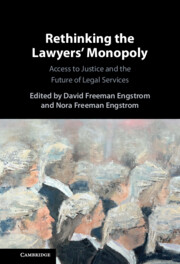Refine search
Actions for selected content:
4 results
7 - Beyond Access to Justice
- from Part II - Lessons from the Field
-
-
- Book:
- Rethinking the Lawyers' Monopoly
- Published online:
- 04 September 2025
- Print publication:
- 18 September 2025, pp 156-172
-
- Chapter
-
- You have access
- Open access
- HTML
- Export citation

Rethinking the Lawyers' Monopoly
- Access to Justice and the Future of Legal Services
-
- Published online:
- 04 September 2025
- Print publication:
- 18 September 2025
-
- Book
-
- You have access
- Open access
- Export citation
7 - Legal Work
-
- Book:
- The Rural Lawyer
- Published online:
- 06 March 2025
- Print publication:
- 13 March 2025, pp 90-108
-
- Chapter
- Export citation
9 - The Supply and Demand of Legal Help on the Internet
- from Part III - Legal Tech and Access to Justice
-
-
- Book:
- Legal Tech and the Future of Civil Justice
- Published online:
- 02 February 2023
- Print publication:
- 09 February 2023, pp 199-224
-
- Chapter
-
- You have access
- Open access
- HTML
- Export citation
